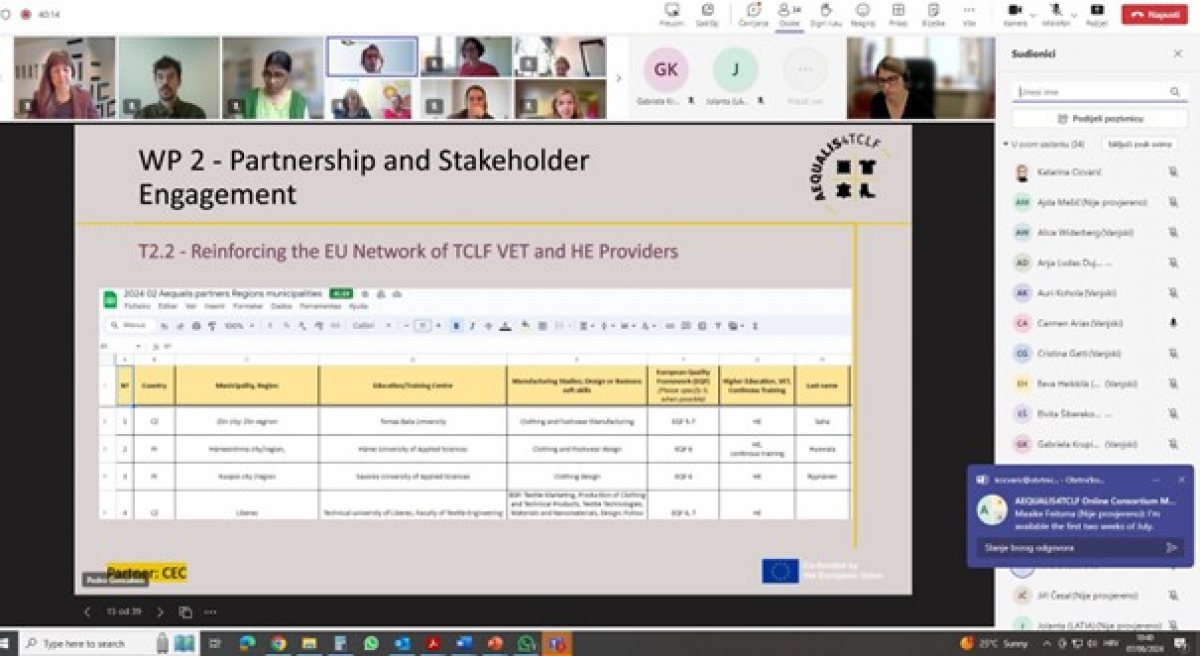AEQUALIS4TCLF
AEQUALIS4TCLF ‑ 3rd consortium meeting
The third partner meeting of the AEQUALIS4TCLF project was held via an online platform on June 7, 2024, with the participation of 33 representatives from 18 partner institutions. The meeting aimed to evaluate the activities carried out so far, as well as to strategically plan and allocate further responsibilities.
Work Package 1 – Project Management and Administration
The discussion covered topics related to the use of digital tools in the implementation of activities. One of the main topics was a detailed discussion on budget management, emphasizing flexibility and allocation within the project budget. After a comprehensive discussion on the budget lines of various activities within each work package, clear and understandable rules for reallocating funds were established. The discussion also highlighted the crucial role of internal reporting. The strategic importance of regular consortium meetings was emphasized, particularly their role in maintaining project agility and ensuring alignment among partners. Coordinators proposed a final virtual meeting in July before the summer break to monitor key tasks and prepare for the in-person meeting scheduled for September in Vilnius, Lithuania.
Work Package 2 – Stakeholder Engagement and Inter-Project Collaboration
The discussion included inter-project collaboration (SkillBridge and METASKILLS), highlighting the importance of strategic coordination to leverage synergies and avoid overlap with related projects. One of the primary focuses of CEC partners is developing a strategy for effectively engaging educational centers, which includes a thorough understanding of the project’s goals and outcomes before initiating partnerships. The aim is to ensure that collaborations are meaningful and that educational providers are well-prepared to integrate project insights and results.
A series of seven webinars targeting educational centers is planned—an initiative designed to keep educational partners informed and engaged throughout the project lifecycle. The first webinar is scheduled for September/October this year.
Regarding regional stakeholder mapping, significant efforts are being made to identify and engage key public authorities, educational providers, and industry bodies across different regions. The goal is to involve stakeholders in the development and implementation of regional skills strategies, ensuring that project outcomes are well integrated into local contexts and needs.
Work Package 3 – Skills Needs Assessment and Gap Identification
The completion of one of the activities within this work package was highlighted, along with the presentation of the survey on future skills and industry trends. The survey is designed to identify specific gaps and skill needs in the TCLF sectors across various target countries. The need for active participation from all partners in disseminating the survey and collecting responses was emphasized, as this is crucial for accurately addressing the evolving demands of the industry.
Work Package 4 – Curriculum Development
An analysis revealed that while some programs are fully dedicated to contemporary needs—such as bachelor’s degrees in smart sustainable design and master’s programs in sustainable management—most of the listed programs are more general. These include various courses in fashion design and business. It was emphasized that there is a significant need for more detailed information on how specific skill components are integrated into these broader programs. Partners were invited to provide more detailed information on the content of these programs, with a particular focus on breaking down comprehensive programs into individual courses or modules where future-relevant skills are taught.
Dissemination and Communication
The meeting also addressed the dissemination of project activities, highlighting the importance of using newly developed promotional materials and maintaining clear and direct communication—not only between partner institutions but also within each partner organization. It was emphasized that each partner organization should designate a specific contact person for internal communication to better support the dissemination process and ensure that communication is directed only to team members directly involved.
The meeting concluded with clearly defined expected outcomes for the upcoming implementation period, along with mutual appreciation among all partners for their contributions toward the shared goal of successful project implementation.


Comments
No comments yet. Be the first to comment!